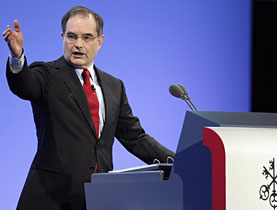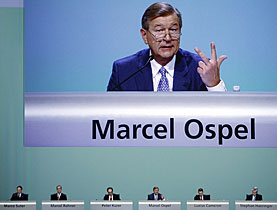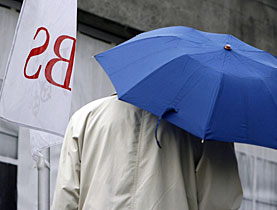Shareholders approve UBS bailout plan

Shareholders at Switzerland's largest bank, UBS, have voted in favour of a $60 billion (SFr72 billion) rescue package from the Swiss National Bank (SNB).
The bailout plan, announced last month, was approved at an extraordinary general meeting in Lucerne on Thursday. UBS will issue extra shares worth SFr36.5 million to help fund its obligations under the terms of the deal.
The Swiss government surprised the market in October by announcing that the SNB would pump SFr6 billion of emergency cash into the bank. In addition, UBS could place up to $60 billion of its toxic assets into a special fund, with the SNB guaranteeing $54 billion.
UBS has agreed to place $6 billion of its own money into the fund, but has made up for this by issuing the same amount in mandatory convertible bonds – that convert into shares – to the Swiss government. The extra shares will be issued to cover this obligation.
UBS chairman Peter Kurer told shareholders that the bailout was now necessary despite delivering an upbeat message at the last meeting at the beginning of October.
“In the days following our general meeting, an increasing number of governments began to intervene with their own rescue packages,” he said. “This resulted in bank clients shifting an increasing volume of their assets to institutions where their money would be guaranteed by the state.
“Consequently, UBS faced a situation, which, given future potential developments, inevitably caused great concerns. We had no other choice but to act in order to stabilize the situation.”
Angry shareholders
Kurer added that it would have been “irresponsible” to decline such an offer in the light of rapidly deteriorating markets.
“Over the course of the financial market crisis, we had seen too many institutions in other countries either having to be bailed out at the last minute or, otherwise being left to their fate. Such a scenario needed to be avoided at all costs,” he said.
“By delaying, we could have endangered the future of the bank, its capital, our clients’ assets and, not least, the future of Switzerland and its future prosperity. In our view, this would have been irresponsible, and we had no intention of taking such a risk.”
Some shareholders responded angrily to the news that shares would be further diluted. One compared it to “robbing the poor to pay the rich”.
“Why is it that banks have this feeling of megalomania, all trying to be the biggest?” the shareholder asked the audience.
Collective responsibility
Shareholders also had the opportunity to voice their opinions – but not vote – on the proposed new compensation structure that would curb bonuses.
Former chairman Marcel Ospel and former chief executive Peter Wuffli as well as other executives no longer with the group have recently announced they will waive bonus payments.
Current chairman Kurer said the bank had clawed back SFr70 million from them.
But one speaker called on the entire board to relinquish not only their bonuses, as they have already done, but also their basic pay. Other shareholders offered more supportive statements.
“Which of us would have demanded a repayment of bonuses if shares had reached SFr100?” he asked. “All of us bear a collective responsibility.”
swissinfo, Matthew Allen in Lucerne
UBS endured a tough 2007 and things seem to have hardly improved in 2008, mainly as a result of the US subprime mortgage crisis.
In July 2007, chief executive Peter Wuffli stepped down following the collapse of the bank’s hedge fund Dillon Read Capital Management.
In October 2007, UBS said it would cut 1,500 jobs in its investment banking arm, including that of its head Huw Jenkins. Chief financial officer Clive Standish left at the same time.
UBS has written down about $44 billion as a result of the subprime mortgage market collapse. Chairman Marcel Ospel stepped down in April.
On October 16, the Swiss National Bank (SNB) agreed to put SFr6 billion ($5.29 billion) into UBS, in a move that aims to strengthen the bank’s capital base and reduce its balance sheet.
Based on an agreement with the SNB, UBS will transfer up to $60 billion of assets to a newly created fund entity and will capitalise the fund with equity of up to $6 billion.
The SNB will finance the fund with a loan of up to $54 billion, secured on the assets of the fund, taking over control and ownership of the entity.

In compliance with the JTI standards
More: SWI swissinfo.ch certified by the Journalism Trust Initiative



You can find an overview of ongoing debates with our journalists here. Please join us!
If you want to start a conversation about a topic raised in this article or want to report factual errors, email us at english@swissinfo.ch.